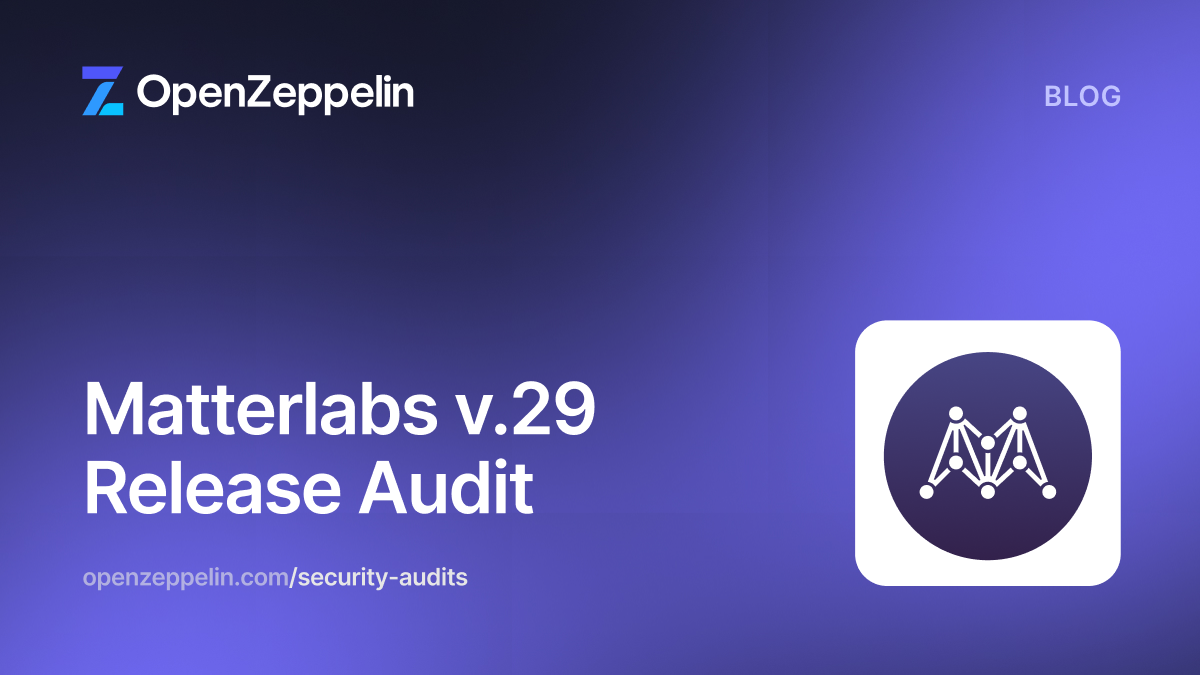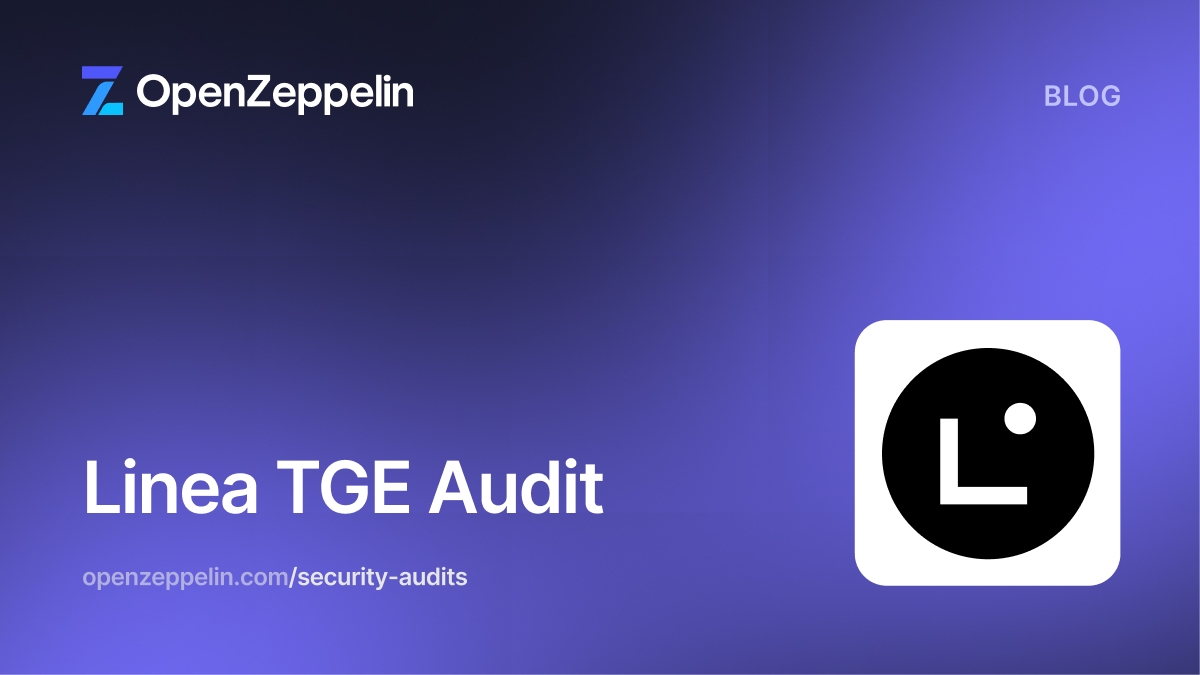June 8, 2023
This security assessment was prepared by OpenZeppelin.
Table of Contents
Summary
- Type
- Governance
- Timeline
- From 2023-03-07
- To 2023-03-09
- Languages
- Solidity
- Total Issues
- 6 (6 resolved)
- Critical Severity Issues
- 0 (0 resolved)
- High Severity Issues
- 0 (0 resolved)
- Medium Severity Issues
- 0 (0 resolved)
- Low Severity Issues
- 3 (3 resolved)
- Notes & Additional Information
- 3 (3 resolved)
Scope
We audited the ScopeLift/flexible-voting repository at the ef95039 commit.
In scope was the following contract:
flexible-voting/src/
└── GovernorCountingFractional.sol
System Overview
The Flexible Voting system developed by ScopeLift allows delegates to split their voting weight into fractions between Against, For and Abstain votes. Without this system, a delegate can only cast their entire voting weight into one of the three options. This splitting of voting weight is particularly useful for delegates (contracts) that store many different users' funds, such as lending protocols, bridges, custodial accounts from centralized exchanges, and zero-knowledge shielded voting systems. Since these delegates contain the voting weight of a variety of different users, it is often the case that different users would like to vote differently on a single governance proposal. Therefore, this system creates a mechanism such that one delegate can split their voting weight proportionally according to the votes of their users. The GovernorCountingFractional contract is an extension to the OpenZeppelin contract-library's Governor contract and replaces the GovernorCountingSimple contract with a few notable differences.
The primary difference, as the use case suggests, is in the counting of votes. The Flexible Voting system overrides the traditional _countVote function by utilizing the bytes memory parameter in the function signature. A non-empty value for this parameter represents the weights that the delegate assigns to the Against, For, and Abstain votes. If the value of this parameter is empty, the total voting weight of the delegate is counted towards only one of the three voting options.
The second difference is in how the contract accounts for the votes cast by an address for any given proposal. The GovernorCountingFractional contract removes the hasVoted mapping from the ProposalVote struct that OpenZeppelin's GovernorCountingSimple contract uses to check if an address has voted on a proposal. Instead, this contract stores the number of votes per account per proposal in the _proposalVotersWeightCast mapping. This allows for the additional functionality of rolling voting, in which one account can vote for a proposal with a portion of its total weight, and then again subsequently with some remainder of its weight. However, once a portion of the weight is cast, that portion cannot be changed in future voting.
In addition to the code review, the integration of the GovernorCountingFractional contract with OpenZeppelin's suite of governance contracts was examined and found to be compatible.
Security Model & Trust Assumptions
The scope of this audit was limited to the GovernorCountingFractional contract and was done under the trust assumption that the governance tokens or ERC-20 tokens used for voting are vetted by the projects integrating with this contract.
The projects integrating with the Flexible Voting system should pay attention to the order of votes encoded in the voteData bytes. This order should align with the order in which the voteData is decoded within the GovernorCountingFractional contract.
Client-Reported Findings
Signature Can Be Replayed for Fractional Voting
After the audit, the client reported an issue in the GovernorCountingFractional contract where signature-based votes can be replayed if the delegate's voting weight was not exhausted, the cast vote utilized less than or equal to half of the voting weight, and the vote was cast using the castVoteWithReasonAndParamsBySig function. This replaying of the signature would result in consuming more of the user's voting weight, while keeping the proportion of the Against, For, and Abstain votes the same.
Consider a scenario where a user with 100 voting weight signs a message to cast four votes, 1 Against, 2 For, 1 Abstain, and calls the castVoteWithReasonAndParamsBySig function. An attacker sees this transaction on-chain and keeps replaying the signature to consume the remainder of the user's voting weight. Therefore, the final vote count would be 25 Against, 50 For, 25 Abstain. Since the castVoteWithReasonAndParamsBySig function does not track the signature's nonce, the votes may be cast against the user's intentions and their voting weight is exhausted.
Update: The ScopeLift team resolved the issue in pull request #51 at commit e5de2ef.
Low Severity
Inconsistent Ordering of Votes
In GovernorCountingFractional.sol, the ProposalVote struct is defined in the following order: againstVotes, forVotes, abstainVotes. This order aligns with the standard usage in OpenZeppelin's contracts library as well as in Compound's Bravo.
However, the voteData bytes parameter received by the _countVote function requires a different order: forVotes, againstVotes, abstainVotes. While the code currently handles the decoding of this bytes parameter correctly, this inconsistency in the ordering can be problematic for projects that are integrating with the GovernorCountingFractional contract.
In the interest of improving clarity and being less error-prone, consider changing the order of the voteData to require votes in the originally-defined order (againstVotes, forVotes, abstainVotes).
Update: Resolved in pull request #40 at commit 8bea587.
Change Quorum to Account for Abstain Votes
The COUNTING_MODE function in the GovernorCountingFractional contract sets the quorum to bravo, meaning that only the For votes are counted to reach the quorum.
It is noted that the projects integrating with this contract can override the COUNTING_MODE and _quorumReached functions to choose their preferred quorum setting. However, since the GovernorCountingFractional contract is to be used as a library, it is recommended to allow both For and Abstain votes to be included in reaching a quorum. This would also help in improving the compatibility and consistency with OpenZeppelin's governance modules.
Consider changing the quorum to for,abstain to be consistent with OpenZeppelin's GovernorCountingSimple contract.
Update: Resolved in pull request #41 at commit 450b444.
Incomplete Docstrings
Although docstrings are present above the _countVoteNominal and _countVoteFractional functions, they do not provide complete information about the purpose of these functions and the parameters passed to them.
Since the GovernorCountingFractional contract supports rolling votes, once an address has cast a portion of its votes using the _countVoteFractional function, the subsequent votes should be cast by calling the _countVoteFractional function again, even if the votes are in favor of only one option.
Consider adding proper docstrings to the functions, following the NatSpec format, stating the scenarios in which these functions should be called, and mentioning their limitations.
Update: Resolved in pull request #42 at commit c19467a.
Notes & Additional Information
OpenZeppelin Imports in Incorrect Format
In GovernorCountingFractional.sol, the current format for importing OpenZeppelin files is import {SomeContract} from "openzeppelin-contracts/...". With the current import statement, developers who are using this contract (particularly those who are not using Foundry as their smart contract development toolchain) may run into compilation errors when trying to integrate. For ease of consumption, consider changing the imports' format to import {SomeContract} from "@openzeppelin/contracts/..." as described in the OpenZeppelin documentation.
Update: Resolved in pull request #45 at commit 540cf75.
Naming Suggestions
To enhance explicitness and readability, there are several areas in the contract that could benefit from more precise and descriptive naming:
- The
proposalvotevariables on line 77 and line 86 are inconsistent withproposalVote, which has camel case and is prevalent both in OpenZeppelin's contracts as well as elsewhere in this contract. Consider renaming it toproposalVotefor consistency. - The
weightvariables on line 107, line 130, and line 159 are not explicit about whichweightthey are referring to. Consider renaming them tototalWeightfor clarity. - The
safeWeightvariable is not explicit about whichsafeWeightit is referring to. For more clarity, consider renaming it tosafeTotalWeight.
Update: Resolved in pull request #43 at commit 17b820f.
Remove Unnecessary Comments
To improve readability, consider removing the following comments related to the Foundry forge format:
- Lines 6 and 7 of the
GovernorCountingFractionalcontract - Line 207 of the
GovernorCountingFractionalcontract
Update: Resolved in pull request #44 at commit c3bf318.
Conclusions
This audit was conducted over the course of 3 days. Through an in-depth review of the GovernorGovernorCountingFractional.sol file, we uncovered three low-severity issues. The ScopeLift team provided clear documentation, which helped the auditors understand this system.
The pull requests containing the fixes were merged to the master branch of the flexible-voting repository at commit 4399694.
Appendix
Monitoring Recommendations
While the ScopeLift team's Flexing Voting system is meant to be used by other projects, it is important for projects that would like to integrate with this system to monitor certain activity. Ongoing monitoring of deployed contracts helps in identifying potential threats and issues affecting the production environment.
Hence, with the goal of providing a complete security assessment, we encourage projects to monitor the events for when proposals are created, voted on, executed, and cancelled. In this case, they should monitor the ProposalCreated, VoteCast, VoteCastWithParams, ProposalExecuted, and ProposalCanceled events.


